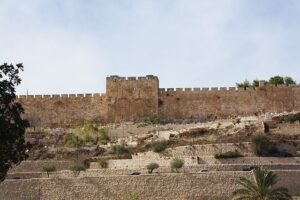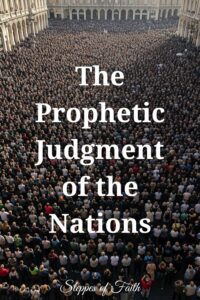
Much of Mathew 24-25 entails several parables—the fig tree, the ten virgins, and the talents—plus two illustrations, each describing the end times. Some believe there is a fourth parable concerning sheep and goats at the end of Matthew 25. But this is not a parable.
It is a prophecy.
The parables follow Jesus’ rebuke of the Pharisees in Matthew 23 and response to the disciples’ follow-up questions in Matthew 24.
“Now, as He sat on the Mount of Olives, the disciples came to Him privately, saying, ‘Tell us, when will these things be? And what will be the sign of Your coming, and of the end of the age?’” (Mt 24:3)
Jesus answers the disciples first by describing the coming Tribulation (24:4-26) and His second coming (24:27-31). He then presents the parables and illustrations to emphasize the importance of being ready when the events occur (24:32-25:30).
In Matthew 25:31, Jesus launches into a description of a future catastrophic event and the judgment that follows. Scholars sometimes refer to this event as the “judgment of the nations.” It should be noted that it differs from the Great White Throne Judgment of Revelation 20:11-15 in several ways.
Since the earth will be gone from existence and all believers will be removed and glorified, the Great White Throne Judgment is for the sinful dead. At that time, Jesus will open the Book of Life to judge them, find them lacking in holiness, and, consequently, cast them into the lake of fire.
The judgment in Matthew 25, on the other hand, concerns those whom Jesus will judge in the Valley of Jehoshaphat at the conclusion of the battle of Armageddon (Rev 16:16). These are flesh and blood people. He will not judge the nations as a whole; He will judge them as individuals. And He will judge them by separating them into two groups—sheep and goats.
Judgment of the Nations
“All the nations will be gathered before Him, and He will separate them one from another, as a shepherd divides his sheep from the goats. And He will set the sheep on His right hand, but the goats on the left.” (Mt 25:32-33)
Matthew 25:32-33 contains two critical elements for Bible readers to note.
First, whenever the Bible uses the word “nations” (Gr, “ethnos”; Heb, “goyim”), it does not include Israel.
“Why do the nations rage?” (Ps 2:1, i.e., rage over Israel)
“I will gather all the nations to Jerusalem to fight against it.” (Zech 14:2)
Recall also Isaiah 59:2-21, which both Paul and Zechariah repeat (Rom 11:26 and Zech 12:10; 13:1, respectively), that all Israel will experience a national conversion to faith in Jesus after being relentlessly attacked by its world enemies.
“It shall be in that day that I will seek to destroy all the nations that come against Jerusalem. And I will pour on the house of David and on the inhabitants of Jerusalem the Spirit of grace and supplication. Then they will look on Me, whom they pierced. Yes, they will mourn for Him as one mourns for his only son and grieve for Him as one grieves for a firstborn.” (Zech 12:9-10)
Therefore, “nations” refers to all the Gentile nations of the world except His chosen nation, Israel, which will nationally accept Jesus as Lord and Savior at that time.
Symbolism of Left and Right
Second, when we read in the Bible of God placing someone on His right side, it is an indication of His blessing. Recall these biblical examples.
- Jacob bypassed Joseph’s firstborn son, Manasseh, and placed his right hand on Joseph’s secondborn son, Ephraim, thus giving him and his descendants a special blessing.
- Moses placed the blood of sacrificed animals on the priests’ right ears, thumbs, and toes to consecrate and dedicate them to their work in God’s service (Lev 8:23-24).
- God placed Jesus on His right side after His death, resurrection, and ascension (Ps 110:1; Rm 8:34; Eph 1:20-23; 1 Pt 3:22).
“After he had made purification for sins, he sat down on the right hand of the Majesty on high.” (Heb 1:3)
Similarly, following the battle of Armageddon, Jesus will judge the nations and place the “sheep” on His right side. These are the surviving Gentile believers from the nations, those who put their faith in Jesus as their Lord and Savior and had already led a lifestyle of caring for others, including Israel. They will enter the eternal kingdom joined by the resurrected, martyred saints (Rev 20:4-6).
“So we, Your people and sheep of Your pasture, will give You thanks forever. We will show forth Your praise to all generations.” (Ps 79:13)
As for the goats, Jesus will put them on His left side. These are the surviving Gentile unbelievers of the nations, those who held disdain for Israel. Jesus will set them in a place of great dishonor and rejection.
At the “judgment of the nations,” God will keep His promise. He will bless those who bless Israel and curse those who curse her (Gen 12:3; Deut 30:7; Num 24:9).

The Real “Least of These”
“Then He will answer them, saying, ‘Assuredly, I say to you, inasmuch as you did it to one of the least of these My brethren, you did it to Me.’” (Mt 25:40)
Because of the phrase “the least of these” in Matthew 25, verses 40 and 45, many believe Jesus is speaking specifically of people in need; however, that is not entirely true.
While followers of Christ should treat people in need with great compassion, here Jesus refers to His chosen people and how the nations treated them. Their identity is not necessarily clear. They could be national Israel, individual Jews, or the 144,000 converted Jews mentioned in Revelation 7, who proclaim the gospel during the Tribulation.
Regardless, as “the King” (v34), Jesus will judge those who treat His people kindly with kindness, allow them to enter the Millennial Kingdom (v34), and gain eternal life (v46). These are the sheep of Matthew 25.
“For whoever does the will of My Father in heaven is My brother and sister and mother.” (Mt 12:50)
“He who receives you receives Me, and he who receives Me receives Him who sent Me.” (Mt 10:40)
These sheep will not yet have received their glorified (resurrected) bodies; they will still be mortal. According to Isaiah 65:20-23, they (believing Jews and Gentiles) will continue to marry, have children, live long lives, and die throughout the thousand years. But God will resurrect them at the end of the Millennium (Rev 20:4).
Concerning the goats, those without compassion for God’s chosen people, lacking devotion to Him, and treating His people derisively, will have a vastly different experience.
“Inasmuch as you did not do it to one of the least of these, you did not do it to Me. And these will go away into everlasting punishment.” (Mt 25:45-46)
Jesus to the Rescue
Recalling Zechariah 12 previously mentioned, chapter 14 continues foretelling the battle of Armageddon and the subsequent “judgment of the nations.” Verses 2-3 describe how the nations will gather against Israel, but God will defend His people. He will return to the Mount of Olives (Acts 1:11), splitting it in two to provide a way for His people to flee.
“Then the LORD will go forth and fight against those nations, as He fights in the day of battle. And in that day His feet will stand on the Mount of Olives, which faces Jerusalem on the east. And the Mount of Olives shall be split in two, from east to west, making a large valley. Half of the mountain shall move toward the north, and half of it toward the south. Then you shall flee through My mountain valley.” (Zech 14:3-5)
The prophet Joel briefly describes the devastation that will follow the nations’ defeat (Joel 3:7-8, 14-17). But the greater outcome is found in Revelation 19:17, when Jesus, called “Faithful and True” and riding a white horse (Rev 19:11), will cast “the beast” and his “false prophet” into the lake of fire. Revelation 20:1-3 subsequently describes Jesus binding Satan for 1,000 years.
Continued Judgment
But what of the global survivors of the battle, those whom God spared judgment?
As the Millennial (not the latter eternal) Kingdom begins, Jesus will issue a universal command that the world must go to Jerusalem to worship and show allegiance to Him. They must also celebrate the Feast of Tabernacles (Sukkot) every Fall. Biblically and historically, this feast celebrates God “tabernacling” with His people (Lv 23:40; Dt 16:14-15), and it will continue to do so in the Millennium.
“And it shall come to pass that everyone who is left of all the nations which came against Jerusalem shall go up from year to year to worship the King, the LORD of hosts, and to keep the Feast of Tabernacles.” (Zech 14:16)
Sadly, as the Millennium continues, some will fall away from their faith, thus becoming “goats.” In His divine judgment, the Lord will withhold rain from them, which will lead to a plague and death.
“And it shall be that whichever of the families of the earth do not come up to Jerusalem to worship the King, the LORD of hosts, on them there will be no rain. If the family of Egypt will not come up and enter in, they shall have no rain. They shall receive the plague with which the LORD strikes the nations who do not come up to keep the Feast of Tabernacles. This shall be the punishment of Egypt and the punishment of all the nations.” (Zech 14:17-19)

Believers Get Ready
The coming Tribulation will be a truly terrible time for the world. But there is hope for those who put their faith in the Messiah Jesus.
God will spare those who presently trust Him from end-time events (1 Thess 1:10, 4:17, 5:9; 1 Cor 15:52; Rev 3:10). For those who do not know Him, the Holy Spirit will continue working throughout the Tribulation, bringing many to faith (Zech 12:9-10; Rev 14:1-5) and sparing them from ultimate judgment.
Though many claim Matthew 25:31-46 is a parable, it is essential to know that it is not simply an illustrative story, as parables are defined. It is a prophecy and a warning. Believers must prepare for Jesus’ return and the events that follow if they want to escape judgment.
Thankfully, Jesus provides specific examples of readiness in Matthew 25. His great promise is that believers, “the sheep of His pasture” (Ps 79:13), will enjoy the Shepherd’s blessings in the Millennial Kingdom if they can persevere in obedience, righteousness, and compassion.
Are you ready for His return?
